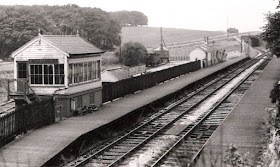Hindlow, Hurdlow, Parsley Hay, and Alsop en le Dale are names that call up images of a sleepy rural past.
And once along time ago they were just a train ride away.
I should know, because yesterday we visited them, along with Hartington, Tissington, and Thorpe Cloud.
One is a collection of eight homes although it does have its own Norman church.
Another has the pub, while the last we encountered still has a fine stately home, built in the 17th century and owned by a family who may have come over with the Conqueror.
What they all have in common was a railway line, built in the last decade of the 19th century, connecting Buxton to Ashbourne.
The wonder is that it was ever built, because this bit of the Peak District was sparsely populated and remained so.
But the line was a lifeline and at its peak six trains a day ran from Buxton to Ashbourne, carrying passengers, minerals, milk and farm produce.
And in the winter it offered a vital link for the villages and hamlets along the way who might other wise struggle when the snow fell.
In 1901 one train which was derailed, remained marooned for three days after a heavy snow storm blocked the line, leaving the crew to be fed by local farmers.
But rail closures are, and were no respecter of communities and ours closed to passengers in 1954, although special excursions were still allowed until 1963, but after that there were no more.
Finally, the line was bought by the County Council and has become a route for walkers and cyclists, commanding fine views across the fields and once past the busy roads, you are plunged into a silent place, interrupted only by the sound of birds.
The route runs through old cuttings, where the trees and the high rock sides seal you in, while at other points the old track is carried on an embankment which offers up perfect views for miles.
And along the way, there can still be found relics of its old railway past, from level markers denoting the gradient to obscure bits of concrete whose function is lost but which will once have done the business of keeping the trains running.
It is easy to get lost in what there is, which at one point included a bunch of stray sheep which had escaped from a neigbouring field, but for me it was the tracks railway past, now just a paragraph in a tourist guide, with one of those faded and slightly blurred old pictures which mean little unless like us you have done that walk.
Location; Derbyshire
Pictures; the Tissington Trail, 2019, from the collection of Andrew Simpson and Alsop en le Dale, railway Station, from the collection of J.Wallace Sutherland of Davenport, http://sutherland.davenportstation.org.uk/aaprint/man.html#70-01
 |
| Along the route, 2019 |
And once along time ago they were just a train ride away.
 |
| Encountering others, 2019 |
One is a collection of eight homes although it does have its own Norman church.
Another has the pub, while the last we encountered still has a fine stately home, built in the 17th century and owned by a family who may have come over with the Conqueror.
What they all have in common was a railway line, built in the last decade of the 19th century, connecting Buxton to Ashbourne.
The wonder is that it was ever built, because this bit of the Peak District was sparsely populated and remained so.
But the line was a lifeline and at its peak six trains a day ran from Buxton to Ashbourne, carrying passengers, minerals, milk and farm produce.
And in the winter it offered a vital link for the villages and hamlets along the way who might other wise struggle when the snow fell.
 |
| As far as you can see, 2019 |
But rail closures are, and were no respecter of communities and ours closed to passengers in 1954, although special excursions were still allowed until 1963, but after that there were no more.
Finally, the line was bought by the County Council and has become a route for walkers and cyclists, commanding fine views across the fields and once past the busy roads, you are plunged into a silent place, interrupted only by the sound of birds.
The route runs through old cuttings, where the trees and the high rock sides seal you in, while at other points the old track is carried on an embankment which offers up perfect views for miles.
And along the way, there can still be found relics of its old railway past, from level markers denoting the gradient to obscure bits of concrete whose function is lost but which will once have done the business of keeping the trains running.
 |
| Alsop en le Dale railway station, circa 1959s |
Pictures; the Tissington Trail, 2019, from the collection of Andrew Simpson and Alsop en le Dale, railway Station, from the collection of J.Wallace Sutherland of Davenport, http://sutherland.davenportstation.org.uk/aaprint/man.html#70-01
No comments:
Post a Comment